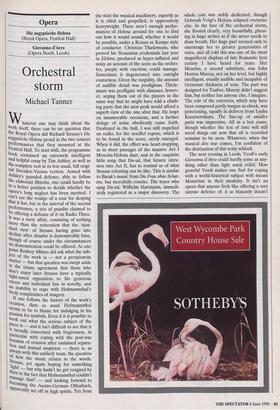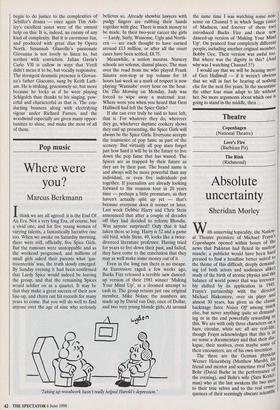Opera
Die aegyptische Helena (Royal Opera, Festival Hall) Giovanna d'Arco (Opera North, Leeds)
Orchestral storm
Michael Tanner
hatever one may think about the W work itself, there can be no question that the Royal Opera did Richard Strauss's Die `legYPtische Helena proud in the two concert Performances that they mounted at the Festival Hall. To start with, the programme book contained an extremely intelligent and helpful essay by Tim Ashley, as well as the complete text in its less usual, full origi- nal Dresden-Vienna version. Armed with Ashley's guarded defence, able to follow the elaborate libretto, one could hardly be in a better position to decide whether the opera's long neglect has been merited. I can't see the vestige of a case for denying that it has, but in the interval of the second Performance, a trio of pundits claimed to be offering a defence of it on Radio Three. It was a sorry affair, consisting of nothing more than the reiteration that the `stan- dard view' of Strauss having gone into decline after Ariadne is demonstrably false, though of course under the circumstances no demonstration could be offered. At one Point Rodney Milnes did ask what the sub- ject of the work is — not a perspicuous matter — but that question was swept aside in the triune agreement that those who don't enjoy later Strauss have a typically tight-assed opposition to his generous excess and individual line in novelty, and an inability to cope with Hofmannsthal's lively complexities of imagery. If one follows the history of the work's creation, then as usual Hofmannsthal seems to be to blame for indulging in his passion for symbols. Even if it is possible to work out what the serious subject of the Piece is — and it isn't difficult to see that it is broadly concerned with forgiveness, in particular with coping with the post-war traumas of reunion after sustained separa- tion and mutual suspicion — there is, as always with this unlikely team, the question of how the music relates to the words. Strauss, yet again hoping for something light' — but why hadn't he got resigned by limn to the fact that Hofmannsthal couldn't Panag e that? — and looking forward to yecoming the Austro-German Offenbach, aPParently set off in high spirits. Yet from the start the musical machinery, expertly as it is oiled and propelled, is oppressively heavyweight. There aren't enough perfor- mances of Helena around for one to find out how it would sound, whether it would be possible, under a Krauss or Kempe style of conductor. Christian Thielemann, who proved his Straussian credentials last year in Elektra, produced as hyper-inflated and noisy an account of the score as the orches- tra, purple with exertion, could manage. Sometimes it degenerated into outright coarseness. Given the turgidity, the amount of audible detail was prodigious. Thiele- mann was profligate with climaxes, howev- er, urging them out of the players in the same way that he might have told a climb- ing party that the next peak would afford a superb view of the one after that. He leapt on innumerable occasions, and a further deluge of noise obediently came forth. Deafened in the hall, I was still stupefied on radio; for the needful repose, which is to be found in the score, rarely emerged. When it did, the effect was heart-stopping, as in short passages of the massive Act I Menelas-Helena duet, and in the exquisite little song that Da-ud, that bizarre intru- sion into Act II, has to remind us of what Strauss relenting can be like. This is similar to Barak's music from Die Frau ohne Schat- ten, but mercifully concise. The tenor who sang Da-ud, Wilhelm Hartmann, immedi- ately registered as a major discovery. The whole cast was nobly dedicated, though Deborah Voigt's Helena eclipsed everyone else. In the face of the orchestral storm, she floated clearly, very beautifully, phras- ing in huge arches as if she never needs to draw breath. Her huge part seemed only to encourage her to greater generosities of voice, and all told this was one of the most magnificent displays of late Romantic lyric ecstasy I have heard for years. Her Menelas, a second substitute, was John Horton Murray, not on her level, but highly intelligent, usually audible and incapable of Germanic thickness of tone. The part was designed for Tauber; Murray didn't suggest him, but neither has anyone else, I imagine. The role of the sorceress, which may have been composed partly tongue-in-cheek, was penetrating, squally in delivery from Lyuba Kazarnovskaya. The line-up of smaller parts was impressive. All in a lost cause, though whether the test of time will still weed things out now that all is recorded remains to be seen. Whatever, when the musical dies irae comes, I'm confident of the destination of this noisy schlock.
The next evening in Leeds, Verdi's early Giovanna d'Arco could hardly come as any- thing other than light aural relief. How grateful Verdi makes one feel for coping with a world-historical subject with means Mozartian in their modesty. It isn't an opera that anyone feels like offering a very intense defence of; it so blatantly doesn't begin to do justice to the complexities of Schiller's drama — once again Tim Ash- ley's excellent notes were of the utmost help on this. It is, indeed, an enemy of any kind of complexity. But it is enormous fun, and produced with great élan by Opera North. Susannah Glanville's passionate Giovanna is not lovely to listen to, but seethes with conviction. Julian Gavin's Carlo VII is callow in ways that Verdi didn't mean it to be, but vocally responsive. The strongest dramatic presence is Giovan- na's father Giacomo, sung by Keith Lath- am. He is striking, gruesomely so; but more because he looks as if he were playing Schigolch than thanks to his singing, pow- erful and characterful as that is. The con- ducting bounces along with electrifying vigour under Richard Fames, and the woodwind especially are given many oppor- tunities to shine, and make the most of all of them.



























































 Previous page
Previous page